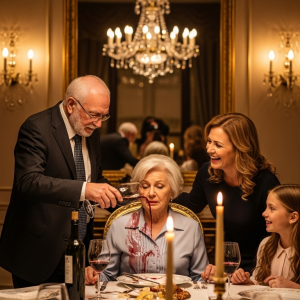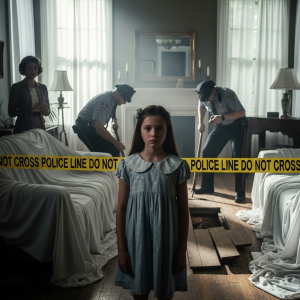The Crystal Rose Grand Ballroom wasn’t just a room; it was a statement. A universe of crystal and gold, where chandeliers dripped light like captured stars onto tables draped in ivory silk. The air, thick with the scent of orchids and expensive perfume, hummed with the low murmur of power.
Here, the city’s architects of fortune gathered. Men and women whose signatures could raise or condemn entire districts. They traded futures between sips of wine that cost more than a month’s salary for the people serving it, their laughter echoing like the chime of a vault door swinging open.
Among them, Lydia Martin moved with a practiced grace that rendered her invisible. Her crisp, black-and-white uniform was a costume of servitude, a cloak of anonymity she had worn for three long years. She knew the rhythm of this world: the clinking of ice in a glass, the soft scrape of a silver fork on porcelain, the precise angle at which to pour wine without a single drop spilling.
Her purpose was simple and absolute: to serve, to smile politely, and to dissolve into the background. She was a ghost in the machine of opulence, and that was exactly how they wanted it.
At Table Four, the gravitational center of the room, sat Daniel Whitmore. His name was not merely spoken; it was a weapon, a key, a storm warning. His empire was etched onto the steel skeletons of a dozen skyscrapers, his influence a shadow that fell across the entire financial district. But for all his wealth, he was most famous for a poverty of the soul—a chilling cruelty that he wore as proudly as his tailored suit.
Lydia approached his table, her movements fluid and silent. She carried a fresh basket of artisanal bread, the warmth of it a small, pleasant reality in this world of cold transactions. As she placed it on the table, Daniel Whitmore didn’t look at her, but through her, as if she were a minor imperfection in the scenery.
His eyes, cold and gray as a winter sky, finally fixed on her. Annoyance tightened the corner of his mouth.
“The pasta is late,” he declared, not as a query, but as a verdict. His voice was a low growl that cut through the nearby chatter, causing a small pocket of silence to form around their table.
Lydia maintained her professional poise, a calm mask she had perfected over a thousand shifts. “My apologies, sir. The kitchen is attending to a large volume of orders tonight. I will check on its status immediately—”
“Shut up and get to work,” Daniel snapped. The words were sharp, brutal, and loud enough to carry. “I don’t pay for the life story of the staff. I pay for service. Now go do your job.”
He dismissed her with a wave of his hand, a king banishing a court jester. The silence around the table spread, rippling through the ballroom. A few guests shifted uncomfortably in their seats, their gazes darting away, not wanting to be caught in the splash zone of his arrogance.
Lydia’s face bloomed with a hot, painful flush. The insult landed like a physical blow, and she felt the furious beat of her heart against her ribs. She swallowed the bitter, sharp retort that rose in her throat, a small, violent rebellion she could not afford. She reminded herself of the mantra that got her through nights like these: pride doesn’t pay the bills. Her father’s medical care does.
With a slight, almost imperceptible nod, she turned and walked away, her spine straight, her dignity the only armor she had left.
The kitchen was an inferno of controlled chaos. Chefs shouted orders over the hiss of searing pans and the clang of steel. Lydia navigated the maze of bodies and heat, her mind a maelstrom. Daniel’s words echoed in her head, each syllable a fresh sting. She wasn’t just a waitress; she was a person, a daughter, someone who was fighting a silent battle every single day.
She secured the plate of pasta—a steaming, fragrant mound of lobster linguine that would have been a luxury beyond imagining for her just a few years ago. She carried it back into the ballroom, her steps measured and deliberate. The plate felt impossibly heavy in her hands, weighted down by the humiliation she was forced to carry with it.
As she arrived back at Table Four, Daniel looked up from his phone, a smirk playing on his lips. He had enjoyed the spectacle, the brief moment of absolute power over another human being. He saw the plate in her hands and gestured impatiently.
“About time,” he muttered, loud enough for his companions to hear, inviting them to share in his contempt.
Lydia leaned forward, preparing to place the dish before him. She didn’t offer an apology or an excuse. She offered only silence, a quiet defiance that seemed to irritate him even more. Her lack of groveling was, to him, an act of insubordination.
It was then that he decided to escalate his lesson in dominance.
As she held the plate steady, Daniel’s hand shot out, not to take it, but to tilt it. In one swift, shocking motion, he upended the entire bowl of pasta over her head.
Time seemed to slow down. A collective gasp swept through the ballroom, sharp and sudden. The world became a horrifying sensory overload for Lydia: the wet, heavy heat of the tomato sauce soaking her hair, the slick slide of pasta down her face and neck, the thick, cloying smell of garlic and seafood enveloping her.
The fine fabric of her uniform was instantly stained a deep, vulgar red. A single strand of linguine clung to her cheek like a grotesque tear. Drips of sauce splattered onto the pristine white carpet at her feet, a stain on the perfect illusion of the Crystal Rose.
Daniel leaned back in his chair, a cruel, triumphant glint in his eyes. He waited for the wave of laughter he expected his bold display to provoke. He had turned the help into the punchline.
But the laughter never came.
Instead, a profound, chilling silence descended upon the grand ballroom. The clinking of cutlery stopped. Conversations died mid-sentence. Every eye in the room—hundreds of them—was fixed on the scene. Not with amusement, but with a mixture of shock, disgust, and disbelief.
From a nearby table, a woman in an elegant, severe black gown slowly rose to her feet. She was Margaret Caldwell, a name that commanded as much respect as Daniel’s, but for entirely different reasons. She was an investor known for her razor-sharp intellect and an integrity as unyielding as granite. Her presence was a force, and as she stood, the atmosphere in the room shifted from shock to judgment.
She stared at Daniel, her eyes two chips of ice, cold and fearless.
“Daniel Whitmore,” she said, her voice not loud, but carrying across the silent room with perfect, cutting clarity. “Do you have any idea who you just humiliated?”
Daniel, seeing the room turned against him, attempted a dismissive laugh, but it came out strained and nervous. “A waitress, Margaret. She’s staff. It’s a bit of a mess, I’ll grant you, but I’ll pay for the cleaning.”
Margaret shook her head slowly, a look of profound disappointment on her face. She walked towards Lydia, her steps deliberate and resonant on the marble floor. She gently took Lydia’s trembling arm, her touch a stark contrast to Daniel’s violence.
“No, Daniel,” Margaret said, turning her gaze back to him. “That’s not ‘staff.’ That is Lydia Martin. Robert Martin’s daughter.”
The name fell into the silence like a thunderclap. Robert Martin.
A wave of murmurs rippled through the room. Heads turned, eyes widened. The name was a piece of the city’s history, a legend whispered in boardrooms and etched onto the cornerstones of the most respected institutions. It was a name synonymous with honor, vision, and a quiet, unshakeable integrity.
Daniel Whitmore’s smirk vanished as if wiped clean from his face. The blood drained from his cheeks, leaving behind a sickly, pale mask of horror. “Robert… Martin?” he stammered, the name a foreign, choked thing in his throat.
“Yes,” Margaret affirmed, her voice as firm as a judge’s gavel. “Robert Martin. The man who built half of this city on a handshake and his word. The man who saw potential in a brash, arrogant young man nobody else would touch. The man who co-signed your first major loan because he believed in you. The man you owe everything to.”
Each word was a nail hammered into the coffin of Daniel’s arrogance. His chest tightened, a band of ice squeezing his lungs. A memory, long buried under years of ruthless ambition, broke through the surface: Robert Martin, his warm hand clapping Daniel’s shoulder in a boardroom full of doubters. Robert, giving him a chance. Robert, the mentor he had promised he would never, ever forget.
And now… his daughter stood before him, drenched in sauce, humiliated by his hand in a room full of the very people he sought to impress.
The judgment in the eyes of the other guests was now palpable, a physical force pressing in on him. The whispers were no longer whispers; they were accusations he could hear as clearly as if they were shouted. Shameless. Ungrateful. A monster of his own making.
Margaret’s voice grew harder, each syllable laden with contempt. “Your entire empire was built on the foundation of that one good man’s faith. And tonight, you desecrated his memory by treating his daughter like dirt beneath your shoe.”
Daniel’s throat was dry. For the first time in two decades, the fear that gripped him wasn’t financial. It was existential. It was the terror of seeing the man he had become, reflected in the disgusted eyes of his peers. He staggered to his feet, his carefully constructed facade of power crumbling into dust.
“Lydia…” he croaked, his voice raspy with a shame he hadn’t felt since childhood. “I… I didn’t know. I swear, I—”
“And would it have been right if you did?” Lydia’s voice cut through his pathetic excuse, sharp as shattered glass.
The truth of her question silenced the entire room once more. She stood there, covered in food, a mess of a woman, yet her posture was straighter, her presence more powerful than anyone else’s in that grand, gilded hall. Her dignity was a light that his darkness could not extinguish.
Daniel was speechless. He was trapped. He could try to storm out, to salvage a shred of his pride through defiance. But he knew, looking at the hundreds of faces watching him, that this single moment would define his legacy more than any skyscraper he could ever build.
And so, Daniel Whitmore, the man who had never bowed to anyone—not to market crashes, not to rivals, not to reason—did the unthinkable.
He knelt.
The sound of his knees hitting the polished marble floor was a deafening crack in the silence. Jaws dropped. A woman’s hand flew to her mouth. The titan of industry was on the floor, brought low not by a competitor, but by a bowl of pasta and the weight of his own forgotten soul.
The ballroom, once the stage for his triumphs, had become his pillory.
“Your father gave me my mind and my heart in this business,” Daniel’s voice trembled, raw and broken. “He taught me that a man’s name was his most valuable asset. And tonight… tonight, I have proven myself unworthy of even speaking his. Lydia… I am so sorry. Not as Daniel Whitmore, the CEO. Not as a wealthy man. But as a human being who forgot what it means to show respect.”
Lydia looked down at the kneeling figure, the sauce still dripping from the hem of her sleeve. In that moment, she didn’t feel triumph, only a deep, profound sadness. Her father’s voice echoed in her memory, a lesson from long ago: True strength isn’t in how high you can climb, my dear, but in how gracefully you can bend.
“You can’t take back what you did,” she said, her voice soft but clear, carrying a strength that filled the room. “A public apology doesn’t erase a private cruelty. If you truly seek forgiveness, don’t seek it from me. Earn it.”
She paused, letting her words sink in, not just for him, but for everyone listening.
“Start by treating every person you meet, from the janitor who cleans your office to the partners who sign your checks, with the same decency and respect my father gave to you when you had nothing.”
A heavy, profound silence followed her decree. It was not a suggestion; it was a sentence. Daniel, still on his knees, could only nod slowly, the truth of her words a crushing weight.
Without another word, Lydia turned. As she walked towards the kitchen doors, the crowd of elites, the movers and shakers of the city, instinctively parted for her. They made way not for a waitress, but for a woman of immense stature, a queen leaving her court.
Margaret Caldwell remained standing for a moment longer, her cold gaze fixed on the broken man on the floor.
“Remember this night, Daniel,” she said, her voice a final, chilling whisper that was more of a promise than a threat. “Because the city will never, ever let you forget it.”
And it didn’t.
From that night forward, the name Daniel Whitmore no longer inspired fear, but a kind of pitying contempt. His story became a cautionary tale whispered in every new intern orientation and every high-stakes negotiation. He had built an empire of glass and steel, but he learned too late that a legacy is built on something far more fragile, and far more valuable: respect. And that, once shattered, could never truly be rebuilt.




